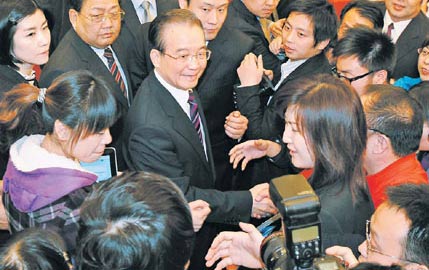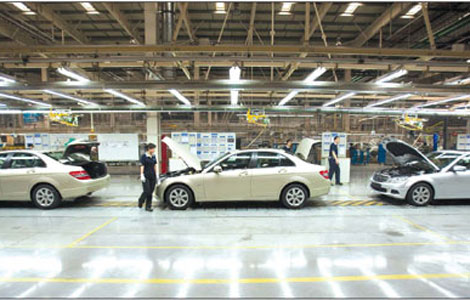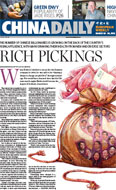Premier maps the road ahead
Updated: 2011-03-18 11:28
(China Daily European Weekly)
|
 Premier Wen Jiabao meets Chinese and foreign reporters in the Great Hall of the People in Beijing on March 14. [Ren Yong/Xinhua] |
Premier Wen Jiabao exuded a welcome message of hope and confidence when he stressed that China will continue to "put people's interests first" even as it continues to make rapid economic strides.
Speaking at a press conference in Beijing on March 14, after the conclusion of the annual session of the 11th National People's Congress (NPC), Wen vowed that his government will work to ensure that everyone shares the fruits of development.
Economic growth
Meeting China's economic growth target over the next five years will not be easy and the government's focus will be on transforming the pattern of development, Premier Wen said.
Achieving annual GDP growth at an average of 7 percent for the 12th Five-Year Plan (2011-2015) period "will not be an easy task", Wen said.
The NPC has approved the 12th Five-Year Plan for economic and social development and adopted a resolution to endorse Wen's government work report. In the report, Wen highlighted development goals in the coming five years and outlined the top government agenda this year.
China still has to resolve long-standing problems in an economy that lacks balance, coordination and sustainability, he said.
Imbalances and coordination problems include the disparities between rural and urban areas, investment against consumption as well as the widening wealth gap.
There is also growing concern over the environmental impact of a resource-fueled economy. Wen said China has to "strike the right balance" between growth, jobs and inflation while reducing pressure from rising costs.
"We must make full use of the opportunity (lower growth rate) to adjust the economic structure ... and enable economic growth to fit in with China's population, environment and resources," he said.
He said China must abandon the "GDP only" mentality and ensure that economic growth is no longer achieved at the cost of resources, energy and the environment.
Political reform
Highlighting reform as an "eternal theme", Premier Wen pledged that China will forge ahead with political and economic restructuring.
"Political and economic restructuring should be advanced in a coordinated way," Wen said.
"Political reform provides a guarantee for economic restructuring," he said. "Without it, economic restructuring would not succeed and its achievements could be lost."
But it is not easy to press ahead with political restructuring in a large country of 1.3 billion people, he said. Political restructuring needs a stable and harmonious social environment and should be pushed forward in an orderly manner.
The premier cited several issues to which political and economic reform would offer solutions. Corruption poses the biggest threat to the country now and the nation should pursue institutional reform to wipe out the root cause of graft, he said.
"The fate of a country lies with the heart of its people," Wen said.
"If we are to address the people's grievances and meet their wishes, we must create conditions for the people to criticize and supervise the government."
Wen made similar remarks in his government work report delivered at the annual NPC parliamentary session last year, when he said: "We will promote transparency of administrative affairs ... let the news media fully play their oversight role, and exercise power openly."
Wen said fairness and justice are the basis of social stability and fairness must be realized in income distribution and promoted in the access to educational and healthcare resources.
Inflation
Inflation will also top the government's agenda this year, Wen said.
"Inflation is like a tiger; once it gets free, it is difficult to put back in the cage."
The country faces both domestic and external challenges in fighting inflation, which reached 4.9 percent in February year-on-year. China has set a target of keeping inflation at or below 4 percent for the whole year.
"International factors are behind China's inflation," Wen said, citing a "certain country's quantitative easing policy" that has led to drastic currency and commodity price fluctuations.
The US Federal Reserve announced in November it would pump $600 billion (431 billion euros) into the US economy to bolster growth, which analysts said would in turn raise the risk of rising prices across the world as it leads to a weakening dollar and increasing liquidity. Oil prices, for example, have recently hovered at around $100 a barrel.
Worse, some even forecast that the US Fed may continue to inject capital into the market after June in a so-called third round of quantitative easing.
"Imported inflation is having a big impact on China, and that's something we cannot easily control," Wen said.
China will strengthen grain production and circulation to ensure food prices are stable, Wen said. Increasing food prices account for about 30 percent of the country's inflation.
The premier also said the government will control liquidity to curb rises in housing prices. "We will eliminate the monetary basis for rises in housing and food prices."
It will also provide more affordable housing for low-income earners, with 36 million units to be built by 2015, Wen said.
"We are confident that we can keep inflation at bay," Wen said.
Private sector
The Chinese government is working on more detailed rules to promote the development of the private economy, Premier Wen said.
The country aims to achieve sound development in the private sector while promoting the State-owned economy, Wen said.
"Currently, there is no situation where State-owned enterprises are advancing while private ones recede," he said. "Neither does the phenomenon exist where private enterprises advance while State-owned ones recede."
Private investment makes up more than 50 percent of the total investment in fixed assets. Among industrial enterprises, the private sector has exceeded the State-owned sector in the number of firms, output value, total assets and number of employees, Wen said.
Although the State-owned sector has a lower proportion of the total economy, it still holds the country's economic lifeline, he said.
"Constantly deepening reform of State-owned enterprises, especially through the establishment of a modern joint-stock enterprise system, also absorbs a lot of social and private capital, which is conducive to the development of the State-owned economy.
"We must unswervingly adhere to the two sectors, to boost joint development of both the State-owned economy and the private sector."
There are more than 8.4 million private enterprises in China, accounting for more than 74 percent of China's total enterprises. The number of private enterprises has grown at an average of 14.3 percent annually over the past five years, according to the All-China Federation of Industry and Commerce.
Their registered capital has surpassed 19 trillion yuan (2.1 trillion euros) with an average growth rate of 20.1 percent every year.
China Daily
E-paper

Factory fever
Despite auto manufacturing bubble scare, car giants gear up expansion of factories.
Preview of the coming issue
Dressed for success
Fabric of change
Specials

Earthquake Hits Japan
A massive 8.8 magnitude quake hit the northeast coast of Japan on March 11,2011.

NPC & CPPCC sessions
Lawmakers and political advisers gather in Beijing to discuss major issues.

Slide: Japan quake
Devastating earthquake and tsunami left millions without water, electricity, homes or heat.
